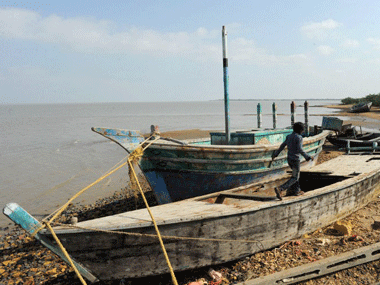This is perhaps the first diplomatic victory for Narendra Modi which he has notched up in less than six months since he became the Prime Minister. Five Indian fishermen who had been given death sentence by a Sri Lankan court on charges of drug trafficking – a charge that entails a mandatory death sentence – have finally walked out free and it is only a matter of time when they are joined with their families. This has been made possible only because of India’s diplomatic clout in its neighbourhood – the island nation in this context. The increasing profile of India under Modi is definitely an important reason for this Sri Lankan gesture. [caption id=“attachment_1790639” align=“alignleft” width=“380”]  Representational images. AFP.[/caption] A question from a politically-minded, whether the previous UPA government would have pulled it off is a matter of conjecture. Of course India has been enjoying certain diplomatic leverages for years and it would be atrocious to believe that Colombo would have gone ahead with the execution of the five Indian fishermen even if a UPA government were in office. Governments don’t work like that. It would be unthinkable to believe that the UPA government would be simply twiddling its thumbs and not do anything substantive had it been in power at this point of time. Given the fact that Sri Lanka has not carried out any execution since 1976, it means that the Indian government had a very good chance to stop the executions otherwise as well. However, at the same time one must appreciate the alacrity with which the Modi government moved and obtained the necessary presidential pardon for the Indian fishermen on death row. Presidential pardons do not come about that easily. The proof of the pudding is in the eating; and the Modi government has demonstrated that it has finally pulled down the curtains on the saga of the five Indian fishermen in question with surgical precision. This is a good omen for India and a thumbs-up for the Modi government. After all, hasn’t India been kicked about by its neighbours – Maldives, Nepal and even Sri Lanka in the past few years? If Indian diplomacy has worked with a neighbour like Sri Lanka where the Chinese political and strategic graph has consistently been on the upswing and Indian influence steadily waning, it is definitely a diplomatic victory for India and the Modi government. Though it is a very important and concrete deliverable for India as well as the Modi government, it is not the be-all and end-all of Indian foreign policy vis a vis Sri Lanka. The real challenge for the Modi government’s Sri Lankan policy is much more difficult: to stem the tide of growing Chinese presence in Sri Lanka, the immediate backyard of India. The real long-term diplomatic challenge for India in Sri Lanka is China. It is well documented how China has been enhancing its strategic footprints in the Indian Ocean region even though it is not an Indian Ocean power. This the real worry for the Indian strategic establishment. Earlier this month a Chinese nuclear submarine and a warship had docked at the Colombo port, the first time when the Chinese submarines were made a part of the military maneuvers by China’s People’s Liberation Army. Seven weeks before this another Chinese submarine had docked at the same port – an interesting timing as it was just ahead of Chinese President Xi Jinping’s maiden India visit. India lodged a protest against this as it contravenes the 1987 accord between India and Sri Lanka which stresses that the two countries’ respective territories, including Trincomalee in Sri Lanka’s case, will not be used by either country for activities which may be prejudicial to each other’s unity, integrity and security. But nothing came off it. Sri Lankan navy spokesman Kosala Warnakulasuriya defended his government’s conduct with the following remarks: “This is nothing unusual. Since 2010, 230 warships have called at Colombo port from various countries on goodwill visits and for refueling and crew refreshment." The achievement of the Modi government in securing a presidential pardon for five Indian fishermen on death row may look even bigger in this backdrop. But then falls in the domain of politics while the issue of the new-found trend of Chinese warships and submarines docking in Sri Lankan ports is strategic. This is the real challenge for the Modi government. One will have to wait and see whether the Indian government is watering the roots or content in watering the leaves only.
If Indian diplomacy has worked with a neighbour like Sri Lanka where Indian influence steadily waning, it is a diplomatic win for the Modi government.
Advertisement
End of Article
Written by Rajeev Sharma
Consulting Editor, First Post. Strategic analyst. Political commentator. Twitter handle @Kishkindha. see more


)

)
)
)
)
)
)
)
)



